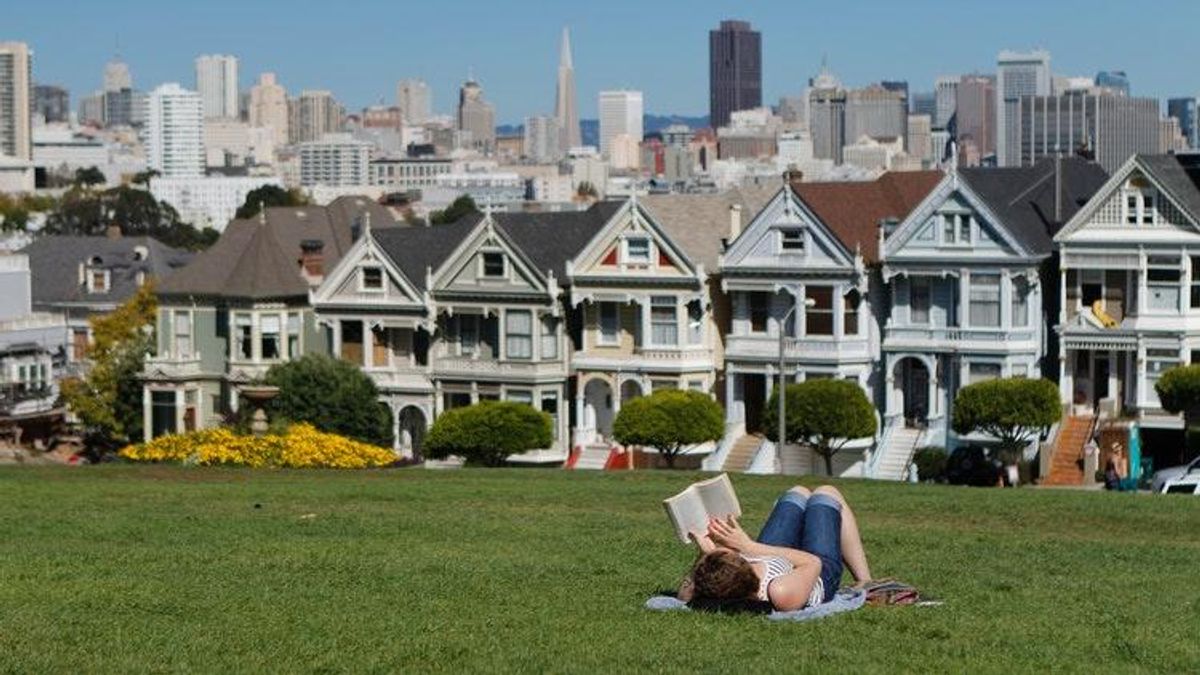Clearly, these are trying and unexpected times. Isolation and sanity dance a cruel dance. We miss our friends, we miss the movies, we miss coffee houses and bars and restaurants, so we seek comfort in familiar and safe distractions. I've taken to old Star Trek episodes and re-reading favorite books. I blew through A Tree Grows in Brooklyn last week and this week, it's everything Armistead Maupin.
Maupin's signature work is Tales of the City, and it's a lovely bit of escapism. I hope heaven is 28 Barbary Lane, San Francisco, 1976. This was a time before AIDS, when San Francisco was a pricey but not obscenely expensive dreamscape, a place where peace and love trumped technology and dollars. Hippies were genuine, peace and love was more than a bumper sticker, and the Age of Aquarius was still in full bloom, at least in my rose-colored memories. I'd been thinking about those rosy memories a lot lately, then I had a revealing conversation with a cool, but pretty straight-laced friend, prompted by Maupin's vision of the City, 44 years ago.
Most of the revelations were mine. I spoke of casual sex, cruising and bars. When I was very young, being gay was illegal. Homosexuality was viewed as a reprehensible and allegedly treatable psychiatric condition. But even so, being gay felt easier and far less complicated then.
I met my partners in person. The internet was science fiction and screen time was devoted to a handful of broadcast television stations and basic cable. There was a perception that since we were outlaws and criminals, and since most STDs could be treated with a big dose of antibiotics, then what the hell? Whoop it up! Go for it with the understanding that Auntie Mame is right - life is a banquet and most of those poor suckers are starving. But after the conversation with my friend, I felt uncomfortable. I felt guilty. I wondered what it would be like to have been settled and married and have had only one or two sex partners for the entirety of my life. What would it have been like to live life devoted to just one person? There was an unsettling regret that perhaps my life was not as well lived as I'd imagined. Then, the universe stepped in to navigate a self-inflicted battle of what if's.
I continued re-reading Tales of the City.
There's a particular line that I absolutely love. The set up is two men, one gay and one straight, sharing a joint on Barbary Lane, circa 1976. Michael Toliver, the gay man predicts, "People like you and me...we're gonna be 55-year-old Libertines in a world full of 20-year old Calvinists."
Well, they'd be 65 now but nevertheless, the world has changed drastically in those decades. Americans stood at a precipice and the chance to leap and fly but said instead, "I don't think so. I'm voting for Ronald Reagan." And then, another virus appeared and the party truly came to a halt. There was no easy fix with this particular STD. AIDS changed the landscape of promiscuity.
Rethinking the conversation with my friend, and reliving a past that was both wonderful and horrifying, I realized that I'd lost perspective. I forgot my past was genuine and precious, and I allowed today to reshape my yesterday. I momentarily took the bait of doubt and shame.
My friend is not a Calvinist, nor are all 20-year-olds by any means. Yet, we find ourselves in the land of "Base" mentality, backward facing morality and disparities that no one imagined for the year 2020. Toss in a dose of COVID-19 and the insane political divisions that emerged in this time of shared anxiety, and you have the dystopian future Michael Tolliver envisioned so many years ago on a rooftop in 1970s San Francisco. But maybe these divisions and distrust are the beginning of the end of this Neo-Calvinist era. Maybe we are better than this. One thing is clear. When this virus is finally defeated, I don't think any of us will ever be quite the same because we've had the opportunity to slow down and reflect.
I can't turn back the clock. I can't rewrite my past, nor do I care to. Tales of the City is a tale, but it's also an inspiration. Sometimes we need rose-colored glasses and a dose of Pollyanna to get through the day. Sometimes Pollyanna is right. Sometimes, truth is stranger than fiction and sometimes fiction overwhelms truth. At the moment though, reality kinda sucks. But as another '70s icon, George Harrison once wrote, "All Things Must Pass." All things that is, except the past. The past lives with me, and I rediscovered the importance of embracing each and every event that brought me to this place.
In a strange way, COVID seclusion is an opportunity. Before you know it there will be a vaccination and this will be a receding memory. Meanwhile we can envision a better, kinder, post-COVID world.
Mine is on Barbary Lane.
Kurt Niece is an artist, jeweler, and author of The Breath of Rapture and Mercury Fields. He lives in Tucson, Ariz.



















































































